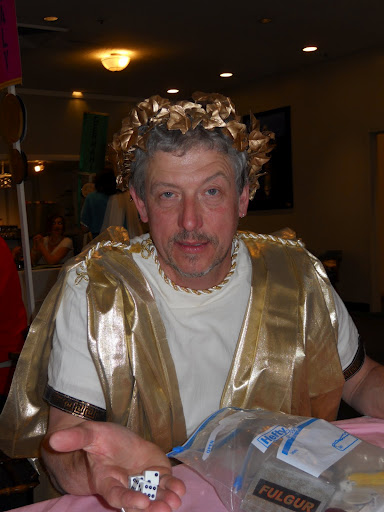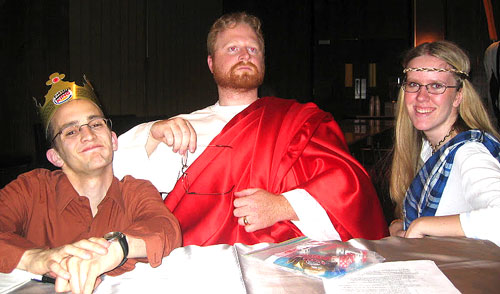Roman gods run rampant in annual reenactment of the Battle of Actium
May 4th, 2012 Posted in Arts and LifeLOGAN—Some students celebrate the end of the semester by burning their notebooks and partying. But USU classics students observe the completion of another school year in quite a different way: by wearing togas and playing the parts of characters and gods from ancient Rome in the period leading up to the famous Battle of Actium in 31 B.C.
 The god behind “The Game” is classics professor Mark Damen, who plays the role of the God of Gods Jupiter in the annual Spring tradition, as classics students, alumni and faculty gather in togas and assorted whimsical costumes to battle through the politics of ancient Rome in the period leading up to a battle that ended the Roman Republic.
The god behind “The Game” is classics professor Mark Damen, who plays the role of the God of Gods Jupiter in the annual Spring tradition, as classics students, alumni and faculty gather in togas and assorted whimsical costumes to battle through the politics of ancient Rome in the period leading up to a battle that ended the Roman Republic.
“The objective of the Game is the objective of life,” Damen said, “which is to conquer people and take their stuff.”
Students play parts of Roman citizens and senators, and rulers such as Cleopatra, Mark Antony and Octavian, while faculty and classics alumni are Roman gods. Together, they reenact the intrigue, politicking and events of history from the death of Julius Caesar in 44 B.C. until the battle of Actium in 31 B.C., when Octavian defeated the combined forces of Marc Anthony and Cleopatra in the Ionian Sea off the Greek coast.
Damen and his colleagues say the Game is a fun way for students to understand Roman history and culture as they play out what could have happened in history instead of what actually happened. This year’s battle, for example, rewrote history on the roll of the dice, as Cleopatra’s fleet came out on in a history-changing outcome that might have derailed Octavian and the Roman Empire.
“The game is really just an extension of trying to get people to understand how Roman culture worked,” Damen said. “This is our study abroad [trip] to Rome for one evening.”
 Essentially, the game is set up as a huge Risk board, as USU’s Skyroom is split up into countries and regions to which players can travel, battling with each other using dice, and bribing fickle gods for their support with “tributes” of candy.
Essentially, the game is set up as a huge Risk board, as USU’s Skyroom is split up into countries and regions to which players can travel, battling with each other using dice, and bribing fickle gods for their support with “tributes” of candy.
Different characters have certain amounts of power, money, and favor with the Roman Senate and Gods—including Minerva, Juno, Jupiter, Neptune and others—who have the ability to control the lives and fates of hapless humans.
In this year’s Game, history professor Kyle Bulthuis played Phobos, the god of fear. Classics graduate Justin Hall came back to play Mars, the god of war, and 2011 alumna Rebecca Richards was Venus, the love goddess.
“It’s just kind of fun to step into the role and play it out,” said history major Cory Yates. “It shows people that we’re not history nerds just reading a book. We’re actually having fun, playing a game and getting into the roles.”
The Game also brings students and faculty together, history major Alisha Leitch added. “It kind of helps the department to bond and you get to know people.”
Joshua Blume, a classics minor, agreed.
“There’s not a lot of classics minors, so it’s good to be around people who appreciate what you appreciate,” Blume said. “I also love it because you get to see a totally different side of the professors.”
 Although students and faculty participate mainly for the purpose of entertainment, Classics Night also serves a number of other purposes.
Although students and faculty participate mainly for the purpose of entertainment, Classics Night also serves a number of other purposes.
“It’s a present to the students,” said classics professor Fran Titchener, said.
Classics Night is also a celebration of students and their accomplishments throughout the year. A dinner is provided to those who attend followed by the recognition of outstanding students who each receive a dictionary from the department. Who was decked out in a new toga-dress as the goddess Juno.
“We also want our students to be able to talk to alumni and see what kinds of jobs they get and what they’re doing with their degrees,” Titchener said.
And with the increased number of alumni present at this year’s game, that goal was met.
“Many people thought it was an outstanding year, partly because we had even more alumni,” she said. “That made the game go better and also really helped by providing role models for the rest.”
TP
Tags: Battle of Actium, classics, Fran Titchener, Mark Damen, Roman Republic

Sorry, comments for this entry are closed at this time.